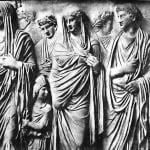Women in the Ancient Jewish Synagogue
When we address the matter of women in ministry in the New Testament, the focus tends to be on evidence for women in leadership roles in the church—and for good reason. But if we zoom out, it is helpful to look at roles that women played in other religious institutions of the time, especially the Jewish synagogues. Most scholars agree that the nature and structure of the Jewish synagogue influenced the formation of the earliest churches (see Wayne Meeks, The First Urban Christians).
Therefore, I have found it advantageous to examine the roles and titles attributed to Jewish women in the synagogue. This doesn’t directly “prove” anything related to Christian churches, but offers a more complete picture of what women could and did do in the ancient world.
For a short, but somewhat technical essay, read THIS.
Mother of the Synagogue, Elder, Synagogue Ruler
We have inscriptional evidence that women sometimes were called “mother of the synagogue.” It has been argued (theoretically) that this was an honorific title, with no administrative function. The meager evidence we have does not make any of this clear, but it is a sensible guess that such “mothers” and “fathers” were wealthy patrons. Even if their wealth played a role in the title, it is hard to imagine they did not exercise strong influence on the synagogue community.
We also know that women were sometimes called “elder.” Some argue this could just be the wives of the male elders, but even if that were true (and there is no solid proof either way), the fact they received such an esteemed title surely meant something about their stature. Perhaps the most grandiose title for women that we come across for women is “synagogue ruler.”
The ruler of the synagogue (archisynagogos), Rufina, erected a tomb monument to her freeman and servants. (Smyrna, 2nd cent CE; CII 741)
No husband is mentioned here, so it does not seem that her “ruler” status is directly tied to a husband. If we look at the New Testament, synagogue rulers (presumably mostly male) were the leaders and representatives of the synagogue (Mark 5, 8; Acts 13, 18). The arch* prefix for Greek words involving roles, titles, or occupations imply a sense of leadership or authority over a group (archiereus, archipoimenos, archipatriotes, archistrategos).
Female “Father” of the Synagogue
We have one unusual case where a Latin inscription refers to a woman as pateressa—a feminine form of the word father (pater). It stands to reason, especially in this case, she would have had duties parallel to a male synagogue leader (pater). Why else call her pateressa and not mater (mother)?
So what?
I agree so much of this information is speculative and guess work, but when it comes to reconstructing the lives of ancient people (including the early Christians), the evidence is often fragmentary. I do not imagine the church or the synagogue of the first century threw off patriarchy like a coat. But there is ample evidence that in this time period in the Roman world some women, especially wealthy women, were seen out and about doing important things. That does not create an open and shut case for women pastors today, but neither can this material be ignored or discounted. Every bit contributes to a more complete picture of the lives of women in the ancient world.












